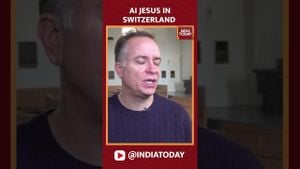Romania is once again astonished by the political upheaval following the first round of its presidential elections, where Calin Georgescu, an independent candidate with right-wing, pro-Russian credentials, captured significant attention by finishing first, thereby signaling a notable shift within the country's political dynamics.
On Sunday, as electoral counts neared completion, Georgescu, 62, secured around 23% of the votes, as per reports from multiple news outlets, thrusting him to the forefront of the race and setting the stage for a runoff election scheduled for December 8. Close behind him was Elena Lasconi, the mayor of Campulung and leader of the pro-European Save Romania Union, who claimed approximately 19%. The results were particularly shocking to observers, as early polls had forecasted Georgescu would barely make it past single digits.
Georgescu's ascent has sparked conversations about the rise of far-right politicians across Europe, amplifying concerns about Romania's direction, especially within the EU and NATO where the country has been regarded as a staunch ally, particularly following Russia's invasion of Ukraine.
Pro-democracy and pro-Western sentiment echoes across the political spectrum, challenging Georgescu's unexpected rise. This election, unlike any previous ones, has been characterized by undeterred voter frustration toward the existing political elite, which many believe has corrupted the system. Political analysts have suggested broader public apathy toward traditional parties and incumbents played significantly to Georgescu's advantage.
Georgia-born Georgescu, former member of Romania's hard-right political scene, has candidly criticized military aid to Ukraine, aligning himself with nationalist and populist sentiments gathering traction among the electorate. His campaign strategy relied heavily on social media, especially TikTok, which he expertly utilized to connect directly with young voters and those disillusioned by mainstream political structures. TikTok, often dismissed by older generations as frivolous, has proven to be Georgescu's most effective platform, where his relatable, straightforward messaging struck chords with many who felt neglected by traditional media.
Political science experts note how Georgescu’s messaging about the "humiliated" and demanding national resurgence significantly overshadowed his opponents, particularly concerning issues related to poverty and economic hardship. “I have voted for the wronged, the humiliated, those who feel they do not matter,” he said during his victory announcement, exposing the electorate's raw emotions and frustrations.
With the current Romanian President Klaus Iohannis reaching the end of his term, declared after 2014, voters face the possibility of Georgescu implementing policies divergent from decades of pro-Western alignment. Once on the fringes, his ideas like closer ties with Russia and skepticism toward NATO's defensive posture have gained unexpected visibility, reshaping the national narrative.
One cannot ignore Georgescu's previous reform efforts, including his time as one of the leaders for the National Liberal Party, during which he developed expertise in pressing environmental issues and was involved with the United Nations as well. This longstanding history adds layers of complexity to his political persona, raising questions about where his ultimate loyalties lie as Romania navigates its future.
Support for Georgescu also surged among Romanian expatriates living abroad, marking their substantial contribution to the electoral process with about 800,000 ballots cast, accounting for one of the highest participation rates seen from the diaspora. A focus on the diaspora hints at how external influences can shape internal politics, reflecting trends seen elsewhere where globalized communities exercise power.
Romania, facing its parliamentary elections just days before the presidential runoff, encounters additional pressures as the coalition government, tied to the Social Democratic Party (PSD) and National Liberal Party (PNL), grapples with potentially diminishing influence. The Electoral Bureau's results prompted parliamentarian forecasts to suggest shifts toward more populist and right-wing parties gaining significant traction.
Georgescu’s narrative is not distinctly different from broader right-wing ascendance across Europe—his story mirrors the Popular Front’s rise to prominence, with potential ramifications for EU governance if these alliances strengthen. Critics are left contemplating the possibility of losing Europe’s collaborative spirit of progress as right-wing sentiment spreads.
Whereas Georgescu’s platform touts promises of nationalism and localized support systems for agriculture and economic autonomy, many political scientists caution against taking the results as endorsement for every aspect of his platform. “The reality is the votes for Georgescu stem from discontent with established politicians more so than broad support for his stances, especially his pro-Russian sentiments,” claims journalist Claudiu Pandaru.
The major worry extends beyond voter choice; it encompasses what Georgescu's presidency would signify. If he emerges victorious from the runoff, observers wonder whether Romania’s longstanding alliances will persist or begin to shift amid his prominent criticisms of European institutions and agreements.
Further complicative layers appear when considering international relations with bordering Ukraine, as Romania has become pivotal for NATO logistics and European political stability against subsequent Russian military aggression. Many abroad watch with bated breath to see how these dynamics influence support for continued assistance to Ukraine as well as broader NATO unity.
"This vote demonstrates the growing skepticism of many Romanians toward the pro-establishment rhetoric perceived as detached from everyday people’s struggles,” suggests Cristian Pirvulescu, highlighting the populist influence reshaping political landscapes worldwide.
Lasconi's challenge as she heads to the runoff may hinge on drawing together the remnants of the moderate center, leveraging claims from her tenure focused on progressive reforms and clean policies against Georgescu's uncertain meta-narrative. Early indicators suggest she may possess the charisma needed to resonate with ordinary citizens eager for balanced governance.
Romanian politics witnessed notable shifts during this first round as the country's electorate reshuffles its priorities and preferences about candidates able to truly connect grassroots sentiments with long-awaited change. Described by political analysts as volatile and unpredictable, Romania’s political fabric has taken on unforeseen shapes and forms this election season, demanding the world's attention.
Whether or not Georgescu’s campaign is merely reflective of post-COVID sentiments or the rise of stable governance from unconventional leaders remains to be seen, but one thing is clear—Romania’s narrative is significantly entwined with the broader story of Europe’s far-right resurgence.
What future awaits Romania's political narrative rests heavily on the next electoral round and what it might reveal about its people’s collective aspirations, fears, and desires for change, stability, or perhaps more than the status quo.”



